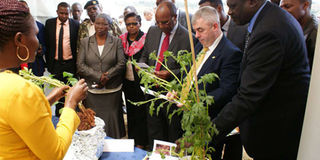New potato programme set to empower smallholder farmers and boost yields

Dr Richard Lesiyampe, the Agriculture Principal Secretary, Irish Minister for Public Works, Kevin ‘Boxer’ Moran and Nyandarua Governor, Francis Kimemia among participants during the launch of the Potato Sector Capacity Building Project at Ol Kalou Stadium. PHOTO | JOHN GITHINJI | NMG
What you need to know:
- Through this venture, smallholder farmers like Gichuhi, will be able to increase their returns following trainings that will be offered.
- Shangi variety is the most prevalent despite being narrow in marketing possibilities especially in export markets according to Nyandarua County Governor, Francis Kimemia.
- Noting that Irish potato, the second most important crop in the country, is cultivated by more than 70 per cent of Nyandarua residents, the governor advocated that more importance be given to its farming.
For Evans Gichuhi, a farmer from Ol Kalou in Nyandarua County, potato farming has been his livelihood’s mainstay for the past 10 years.
Farming the crop on 60 acres, the farmer says his harvest has always averaged 80 extended bags of 110kg each per acre, translating to slightly less than nine tonnes of harvest.
Gichuhi’s potato yields could be much more than this, according to experts, if he practised the appropriate guidelines for cultivating the crop.
“With appropriate farming practices such as soil testing, seed cleaning, use of certified seeds, right fertiliser application regimen and mechanisation, you can easily harvest up to 40 tonnes of potatoes per acre,” said Dr Richard Lesiyampe, the Agriculture Principal Secretary, during the launch of a potato initiative this week in Nyandarua.
The initiative by the Embassy of Ireland and Nyandarua County Government is known as Potato Sector Capacity Building Project.
It will be implemented by the International Fertiliser Development Centre (IFDC), partnering with Kevian Kenya Ltd, and IPM Potato Group; an Irish company.
Through this venture, smallholder farmers like Gichuhi, will be able to increase their returns following trainings that will be offered.
“We will also facilitate access to affordable certified potato seeds and link farmers with markets for their produce,” said Dr Vincent O’Neill, the Irish ambassador, whose government pledged Sh125 million funding for the project over the next three years.
HIGHLY NUTRITIOUS FOOD
“Lack of certified potato seeds has always been a major challenge to the crop’s cultivation. This has in most cases led to farmers recycling their harvests as seeds, leading to an even lower yields than should be.
Shangi variety is the most prevalent despite being narrow in marketing possibilities especially in export markets,” noted Nyandarua County Governor, Francis Kimemia.
He acknowledged that there are snags in land preparation methods, incorrect use of farm inputs, inappropriate use of pesticides, and lack of adequate and timely information to farmers, acknowledging that packaging has also been a challenge.
Noting that Irish potato, the second most important crop in the country, is cultivated by more than 70 per cent of Nyandarua residents, the governor advocated that more importance be given to its farming.
“And furthermore according to nutritional experts, potatoes are a highly nutritious food as they provide carbohydrates, more potassium than bananas, and energy. They also contain no fat, sodium or cholesterol, and supply vitamin B6, magnesium, fibre, antioxidants and nearly half of requisite daily value of Vitamin C in the body,” said the governor, imploring farmers to take up its farming.
Irish Minister for Public Works, Kevin ‘Boxer’ Moran noted the importance of the crop supporting up to 800,000 smallholder farmers across the country, employing about 2.7 million people along its value chain, and contributing over Sh50 billion to the Kenyan economy.
The Kenya Plant Health Inspectorate Services (Kephis), and Kenya Agricultural and Livestock Research Organisation (Kalro), together with Irish agencies such Sustainable Food Systems Ireland and the Irish Agriculture and Food Development Authority, Teagasc, will facilitate the running of the programme.





